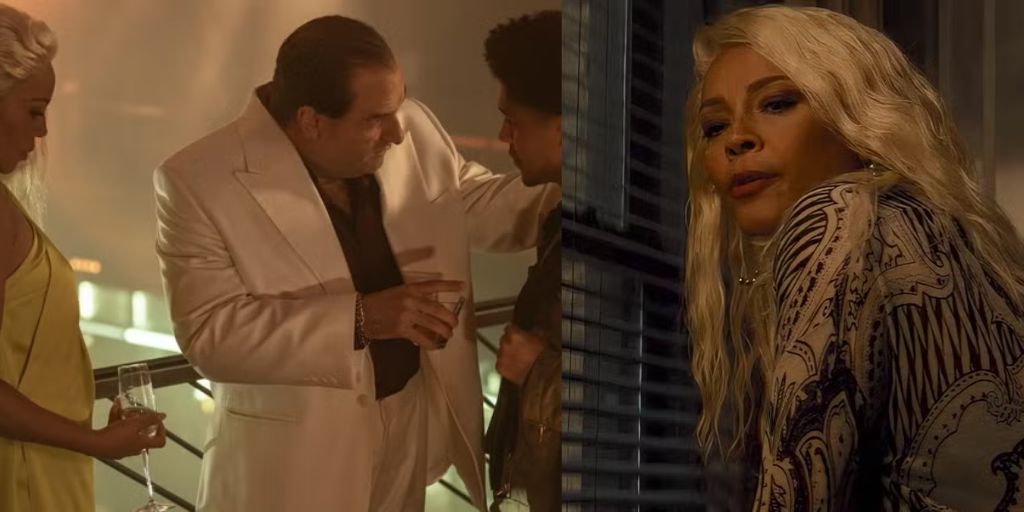The character Eve Karlo in The Penguin, played by Carmen Ejogo, surprises viewers in many ways. Her role shows that Hollywood is starting to rethink how female characters appear in mob stories. For many years, women in these types of stories often played minor roles.
They were usually side characters or just love interests who did not have a lot of depth. However, Eve’s character marks a shift in this trend. The Penguin takes a step forward in correcting these past mistakes. This change is not only seen in Eve’s character but also in the fierce portrayal of Sofia Falcone, played by Cristin Milioti.
Eve Karlo is the love interest of Oz Cobb, also known as The Penguin, portrayed by Colin Farrell. Her portrayal as a sex worker is significant. It offers a fresh perspective that is often missing from gangster films. In many movies, sex workers are portrayed in a negative light.
They are either tragic figures or are exploited by male characters. However, in The Penguin, Eve breaks away from these stereotypes. She emerges as a strong and independent character who stands out in a world dominated by men.
Carmen Ejogo brings Eve to life with a fantastic performance. She plays Eve with both poise and defiance. Most of Eve’s scenes are set in the kitchen, where she often interacts with Oz. The chemistry between Ejogo and Farrell is electric, making their scenes engaging to watch.
Most importantly, both characters are written as equals. While Oz is a bold gangster, Eve is portrayed as courageous and moral. In a series that mainly focuses on the villains in the Batman universe, Eve shines as a beacon of light. She refuses to be used as a pawn in the games played by the men around her.
The Bold Introduction of Eve Karlo
When viewers first meet Eve in Episode 1, she bursts onto the scene with confidence. This introduction feels monumental. Eve is not just a character in the background anymore. She was once the type of character who would appear in the sidelines of mob movies.
Often, she was there only to serve as an object of affection for the male characters. However, Eve is different. She is the closest thing to love in Oz’s life, but she refuses to be a pawn in his ambitions.
She openly rebels against the typical portrayal of sex workers in films, where they are often seen as tragic or exploited characters, as seen in series like The Sopranos. Eve’s determination to protect her own family makes her a survivor, not just a victim.
Carmen Ejogo plays Eve with a fiery spirit. She contrasts her steady, calm demeanor with Farrell’s loud and erratic rants. As the first season of The Penguin progresses, Eve becomes a crucial player in the story. Her true strength is revealed in Episode 5, titled “Homecoming.”
In this episode, after Oz kills mob boss Sal Maroni’s family, he takes Eve to his hideout. During this intense moment, Eve delivers the most powerful response to Oz: she says, “No.” This scene is unsettling as Oz reacts violently, shattering a vase. However, Eve stands her ground.
The vase shattering symbolizes Eve breaking free from the expectations placed upon her. She is willing to sever ties with Oz if it means ensuring her survival and the safety of her girls. This scene is one of the few moments where we see Oz vulnerable. He is nearly in tears while Ejogo plays Eve with a reserved dignity.

It is often the case in films that women are portrayed as “hysterical” during break-ups or arguments. Here, the series refreshingly reverses this trope. Eve’s rejection of Oz leads him down a dark path. His mother later rejects him when he seeks comfort, showing how Eve’s strength directly impacts Oz’s story. By the end of Episode 5, as women in Oz’s life pull away from him by saying “no,” Eve stands as a powerful symbol of female resilience.
Eve’s Journey of Revenge in The Penguin
The theme of women seeking revenge against men who have wronged them becomes clear in Episode 6, titled “Gold Summit.” In this episode, Eve takes control of her own narrative. The most important confrontation occurs when Sofia tracks Eve down for vengeance against Oz.
Sofia arrives at Eve’s apartment, armed and ready to confront Oz. In a surprising twist, the two women become allies rather than enemies. Ejogo and Milioti deliver excellent performances as they share their painful experiences at the hands of men, especially Oz.
Eve’s vulnerability is what ultimately saves her. It is significant that she sheds her blonde wig and extravagant clothes during this scene. Instead, she appears with her natural hair and simple clothing. This change reflects her shedding the performance she maintained while with Oz.
In this moment of honesty, Eve and Sofia reach a crucial understanding. Eve tells Sofia that the Hangman killed several of her girls. Sofia, in turn, reveals that her father was the Hangman, and Oz helped him evade capture. This realization allows Eve to take decisive action against Oz. She tells Sofia where Oz and his mother, Francis, are hiding.
Throughout Season 1, Eve evolves from being Oz’s comfort to becoming a key player in his downfall. In many TV shows and films, sex workers often face tragic endings or suffer abuse. Their trauma is frequently exploited for shock value. In The Penguin, sex workers are among the Hangman’s victims.
However, they are given a voice in this series. Their deaths carry weight and significance. They become the catalyst for Eve’s revenge. The narrative gives Eve the chance to seize her own story and reclaim her life, marking a significant step forward for the representation of women in media.
Family and Feminine Strength
Family plays a central role in The Penguin Season 1, and there is no stronger bond than that between Eve and her girls. This connection is part of why Sofia refrains from killing Eve. It makes sense that Sofia and Eve, who have both suffered at the hands of the Hangman, are now united in their goal to bring him down.
The creators of The Penguin are changing the gangster genre. They are not only giving women a seat at the table but also allowing them to speak while the men listen. This shift is exemplified in Episode 4, titled “Cent’anni,” which showcases strong female voices.
The creation of Eve for the series raises the show’s quality and heightens the theme of revenge. It also enhances the presence of strong feminist archetypes. When Eve tells Sofia that she “deserves a shot” after revealing Oz’s hiding place, it becomes a powerful moment. As she sips her glass of whiskey, it is clear that she is taking control of her life. This moment highlights Eve’s transformation from a side character to a central figure in her own story.
Eve’s evolution throughout the series is notable. Initially, she is seen as a secondary character in Oz’s life, providing comfort and support. However, as the story unfolds, she emerges as a formidable presence. Her journey from being a pawn in Oz’s game to calling the shots is significant.

This change illustrates how the show is reshaping the traditional narratives found in gangster stories. Eve’s character demonstrates that women can be strong, complex, and resilient, even in a male-dominated environment.
The Impact of Eve’s Character on the Series
Eve’s character impacts the series significantly. She provides a refreshing perspective on the portrayal of women in gangster stories. By presenting a multi-dimensional female character, The Penguin challenges traditional stereotypes. The series recognizes that female characters can be strong and resilient without losing their humanity. Eve’s journey illustrates that women can be more than mere background figures in stories that focus on men.
The portrayal of Eve as a survivor resonates with viewers. It shows that women can rise above their circumstances and fight for their own narratives. This message is particularly important in a genre that has often sidelined female characters. Eve stands as a testament to the strength of women who refuse to be victims. Her character highlights the importance of agency and choice, which is often absent in portrayals of women in similar stories.
Moreover, the series does not shy away from addressing the harsh realities that sex workers face. By giving Eve a voice and agency, The Penguin upgrades the conversation around sex work. It humanizes sex workers, portraying them as complex individuals with their own desires and struggles. Eve’s character serves as a powerful reminder that every person has their own story.
The Strong Themes of Female Resilience
The themes of female resilience and empowerment are central to Eve’s story in The Penguin. As the series progresses, Eve becomes a figure of strength and determination.
She refuses to be a passive participant in her life. Instead, she takes control of her destiny, showing viewers the power of self-advocacy. This portrayal is vital in a world where many female characters often succumb to their circumstances.
Eve’s character challenges the norms of how women are typically portrayed in gangster stories. Instead of being a mere love interest or a tragic figure, Eve emerges as a fierce survivor.
Her strength is evident in her decisions and actions throughout the series. She makes it clear that she will not be used by the men around her. This shift in character dynamics is refreshing and contributes to the full narrative of The Penguin.
Furthermore, Eve’s journey serves as a mirror for the audience. It reflects the struggles that many women face in their own lives. Her story resonates with those who have ever felt marginalized or powerless. Eve’s resilience inspires viewers to reclaim their narratives and assert their agency. This empowerment is a crucial element of her character arc, making her a relatable and inspirational figure.
Conclusion: Eve Karlo as a Role Model
Eve Karlo’s character in The Penguin represents a new kind of heroine in gangster stories. She defies the typical stereotypes and emerges as a symbol of strength and resilience.
Carmen Ejogo’s portrayal brings depth to Eve, showcasing her courage and determination. Throughout Season 1, Eve evolves from a secondary character to a powerful force in her own right.

The impact of Eve’s character extends beyond the screen. She serves as a role model for women everywhere. Her journey highlights the importance of self-advocacy and the strength that comes from standing up for oneself.
In a world that often undermines female voices, Eve’s story is a breath of fresh air. It reinforces the idea that women can take control of their narratives and fight for their place in society.
As The Penguin continues, it will be exciting to see how Eve’s character develops further. Her story offers a glimpse of what is possible when women are given agency in their lives. Eve Karlo is not just a character; she is a symbol of resilience, empowerment, and the enduring strength of women.














